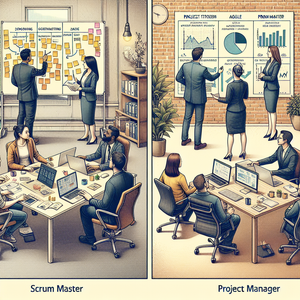
Navigating Career Paths: A Comprehensive Guide to Project Management and Engineering Management
In the ever-evolving landscape of project and engineering management, professionals frequently encounter pivotal career decisions that can shape their futures. The choice often lies between roles that emphasize technical acumen and those that highlight managerial skills. While both project managers and engineering managers are dedicated to achieving successful project outcomes, their responsibilities and required skill sets present distinct paths. Project managers are primarily focused on delivering projects on time and on budget, ensuring seamless communication among all stakeholders. Conversely, engineering managers lead technical teams and enhance engineering processes, showcasing a blend of leadership and technical expertise. This article aims to illuminate the various career trajectories available in these fields, helping individuals align their choices with their passions and strengths.
Job Summaries:
Technical Project Manager (TPM):
- Technical Project Managers play a critical role in ensuring technology projects are delivered on schedule and within budget constraints.
- They serve as the communication bridge between engineering teams and stakeholders, translating intricate technical details into clear project milestones.
- A solid foundation in methodologies such as Agile or Scrum is essential, along with a background in engineering or computer science.
- Certifications like PMP or Agile Certified Practitioner can enhance career prospects.
- As these professionals navigate the intersection of technical execution and project oversight, they are integral to the successful delivery of engineering initiatives.
Engineering Manager:
- Engineering Managers are responsible for leading engineering teams.
- They ensure that projects adhere to both technical standards and organizational objectives.
- This role requires strong leadership abilities.
- It involves mentoring engineers, managing workflows, and keeping projects on track.
- Typically, Engineering Managers hold a degree in engineering and possess relevant experience.
- They excel in communication to coordinate with stakeholders across various departments.
- By balancing people management and process optimization, they significantly contribute to innovation and efficiency within engineering projects.
Project Engineer:
- Project Engineers concentrate on the technical dimensions of projects, including planning, design, and implementation.
- They collaborate closely with project managers to ensure that engineering requirements are met while adhering to budget and timeline constraints.
- A bachelor’s degree in engineering, combined with strong analytical and problem-solving skills, is essential for this role.
- Depending on the industry, additional certifications, such as a Professional Engineer (PE) license, may be required.
- Their technical expertise is invaluable in helping project teams navigate challenges and achieve high-quality deliverables.
Technical Lead:
- Technical Leads direct engineering teams through the technical aspects of projects.
- They offer problem-solving expertise and ensure adherence to technical standards.
- A deep understanding of the relevant technologies is critical.
- Effective leadership skills are critical for this role.
- Typically, this role requires a bachelor’s degree in a relevant engineering discipline.
- Several years of practical experience are required.
- Technical Leads work closely with project managers.
- They ensure that technical capabilities align with project goals.
- Technical Leads are essential to project success.
Scrum Master:
- Scrum Masters facilitate Agile project management frameworks, ensuring that teams effectively adhere to Scrum principles.
- They help maintain focus on project objectives, resolve impediments, and promote continuous improvement.
- Strong organizational and communication skills, coupled with a solid understanding of Agile methodologies, are vital for success in this role.
- Certifications such as Certified ScrumMaster (CSM) can enhance career opportunities.
- This position serves as a crucial link between project management and team dynamics, fostering a productive work environment.
Systems Engineer:
- Systems Engineers are responsible for designing and integrating complex systems.
- They ensure that all components function seamlessly together.
- They analyze requirements, manage specifications, and oversee validation processes.
- Typically, this role requires a bachelor’s degree in systems engineering or a related field.
- Experience in systems analysis and project management is also required.
- Their expertise ensures that engineering projects meet both functional and performance standards.
Program Manager:
- Program Managers oversee multiple interconnected projects, ensuring alignment with the organization’s strategic objectives.
- They manage resource allocation, dependencies, and stakeholder communication, often requiring a background in project management along with strong leadership skills.
- Program Managers frequently hold advanced degrees and have substantial experience in project and program management methodologies.
- Their ability to contextualize individual projects within the broader organizational framework is vital for overall success.
Construction Project Manager:
- Construction Project Managers specialize in managing construction projects from initial planning through to completion.
- They oversee budgets, schedules, and compliance with safety regulations.
- Typically, this role requires a degree in construction management or civil engineering, along with certifications like Certified Construction Manager (CCM).
- Their coordination of contractors, engineers, and stakeholders is essential for project success.
Product Manager:
- Product Managers are focused on the development and lifecycle of products, ensuring alignment with market demands and company strategies.
- They collaborate with engineering, marketing, and sales teams to define product requirements and prioritize features.
- A background in business or engineering, paired with strong analytical and communication skills, is crucial.
- Product Managers serve as a vital link between technical teams and market needs, significantly impacting project outcomes.
Quality Assurance Manager:
- Quality Assurance Managers oversee quality assurance processes for engineering projects.
- They ensure that deliverables meet established standards.
- They develop testing protocols.
- They conduct audits.
- They manage quality control teams.
- Typically requiring a background in engineering or a related field.
- They need experience in quality management systems.
- Their role is essential in minimizing defects and ensuring customer satisfaction.
By exploring these diverse career options, individuals can better identify paths that resonate with their skills and interests in project and engineering management. Current industry data indicates that roles such as Technical Project Manager and Engineering Manager are in high demand, with competitive salaries reflecting their significance in the workforce. For those interested in pursuing these opportunities, reviewing job openings in these areas can provide valuable insights and help professionals make informed decisions about their career trajectories. In this dynamic field, understanding the nuances of each role can empower individuals to navigate their career paths with confidence.
Explore More Jobs

